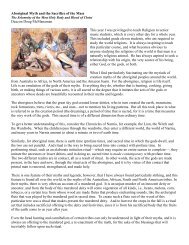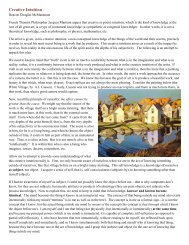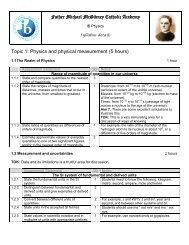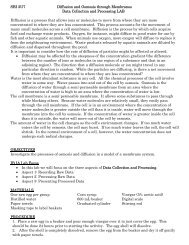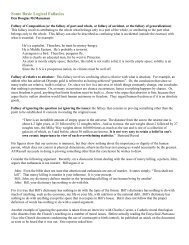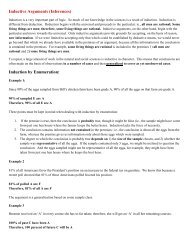"The Basic Ideas of Mircea Eliade's The Sacred and the Profane"
"The Basic Ideas of Mircea Eliade's The Sacred and the Profane"
"The Basic Ideas of Mircea Eliade's The Sacred and the Profane"
Create successful ePaper yourself
Turn your PDF publications into a flip-book with our unique Google optimized e-Paper software.
<strong>and</strong> rejuvenation, literally, to become young again. <strong>The</strong> governing idea is that by doing<br />
certain things, such as exercising, we can return ourselves to that time when we were<br />
younger, healthier, <strong>and</strong> <strong>the</strong> like.<br />
Consider also <strong>the</strong> notion <strong>of</strong> New Year's resolutions. If <strong>the</strong>re is something about yourself<br />
which must be corrected, why wait until January 1st to do something about it? Why not<br />
resolve now to study more, watch television less, etc.? Yet <strong>the</strong> tradition <strong>of</strong> making<br />
resolutions as one begins a new year still is meaningful for people. <strong>The</strong>re must be some<br />
way that a new time somehow affects us, so we think we will be different because <strong>the</strong><br />
time is different. This may be merely self-deception if we don't actually do something<br />
different with <strong>the</strong> new time -- <strong>the</strong> way someone who has not studied since kindergarten<br />
says confidently, "Next semester I'll do better." -- but it may actually lead to real changes<br />
if we seize <strong>the</strong> opportunity. Planning how to "put <strong>the</strong> right foot forward" at <strong>the</strong> beginning<br />
<strong>of</strong> a new semester, or a new job, or when moving into a new social group is a similar kind<br />
<strong>of</strong> thing. Each "new" time opens up possibilities that really were not available before, in<br />
<strong>the</strong> "old" time <strong>and</strong> old situation. And starting <strong>of</strong>f "on <strong>the</strong> wrong foot" makes it much<br />
harder to establish good relationships. E.g., it may take a month <strong>of</strong> being on time before<br />
someone forgets that you were late for <strong>the</strong> first date.<br />
From <strong>the</strong>se examples you can see that, like sacred space, <strong>the</strong> notion <strong>of</strong> sacred time is also<br />
paradigmatic <strong>and</strong> can be extended. For example, <strong>the</strong> repetition <strong>of</strong> <strong>the</strong> cosmogony may be<br />
<strong>the</strong> great sacred day, but <strong>the</strong>re are many individual sacred days, such as Christmas or<br />
Passover in which time is qualitatively different from pr<strong>of</strong>ane time for those, such as<br />
Christians <strong>and</strong> Jews, who belong to those religious traditions.<br />
<strong>The</strong> prevailing notion for Eliade is that <strong>the</strong> time <strong>of</strong> creation was a good one, that all <strong>the</strong><br />
divine forces were at work on <strong>the</strong> earth (as, for example, in <strong>the</strong> Genesis 2 story <strong>of</strong> <strong>the</strong><br />
Garden <strong>of</strong> Eden where Adam <strong>and</strong> Eve lived in harmony with God <strong>and</strong> nature before <strong>the</strong>y<br />
ate <strong>the</strong> forbidden fruit). This may sound like nothing more than nostalgia, <strong>the</strong> belief that<br />
somehow everything was so much better at an earlier time in history, like <strong>the</strong> way older<br />
people might idealize <strong>the</strong> time <strong>of</strong> <strong>the</strong>ir youth. But <strong>the</strong> examples above show that this<br />
notion <strong>of</strong> a "time <strong>of</strong> creation" is not merely that. In fact, in some ways <strong>the</strong> idea <strong>of</strong> "sacred<br />
time" takes its meaning as much from <strong>the</strong> open-endedness <strong>of</strong> <strong>the</strong> future as it does from<br />
<strong>the</strong> treasured experiences <strong>of</strong> <strong>the</strong> past. This is a key example <strong>of</strong> how a "religious"<br />
phenomenon is religious precisely because it highlights a common human phenomenon.<br />
<strong>The</strong>re are two important consequences to this <strong>the</strong>ory <strong>of</strong> sacred time. First, <strong>the</strong> cosmogony<br />
is actually repeated during foundational religious rituals. <strong>The</strong>se are not simply acts <strong>of</strong><br />
"memory" in <strong>the</strong> sense <strong>of</strong> thinking about something that happened in <strong>the</strong> past. A preacher<br />
might urge a congregation to "picture yourselves listening to Jesus telling a parable," but<br />
that is basically an intellectual exercise where people try to imagine what those events<br />
might have been like. "<strong>Sacred</strong> time," however, is <strong>the</strong> ritualized experience where<br />
participants actually do go "back in time" or, more accurately, bring that "past" sacred<br />
time "forward" into <strong>the</strong> present reality <strong>of</strong> <strong>the</strong> celebrating community. Obviously, if<br />
participants were to "step outside" <strong>the</strong> ritual event, <strong>the</strong>y could see that <strong>the</strong>y did not<br />
physically change <strong>the</strong> place where <strong>the</strong>y were <strong>and</strong> that time actually continued to pass



